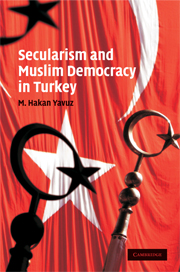Book contents
- Frontmatter
- Contents
- Preface
- Abbreviations
- Map of Turkey
- Introduction: what is an Islamic party? Is the AKP an Islamic party?
- 1 Historical and ideological background
- 2 Political and economic origins of the AKP: opportunity spaces and the backlash of February 28, 1997
- 3 Ideology, leadership and organization
- 4 Kabadayı and mağdur: Erdoğan and Gül
- 5 Modes of secularism
- 6 The Kurdish question and the AKP
- 7 The foreign policy of the AKP
- 8 The political crisis and the 2007 elections
- Conclusion: the end of dual sovereignty and the creole political language
- Bibliography
- Index
- CAMBRIDGE MIDDLE EAST STUDIES 28
6 - The Kurdish question and the AKP
Published online by Cambridge University Press: 05 June 2012
- Frontmatter
- Contents
- Preface
- Abbreviations
- Map of Turkey
- Introduction: what is an Islamic party? Is the AKP an Islamic party?
- 1 Historical and ideological background
- 2 Political and economic origins of the AKP: opportunity spaces and the backlash of February 28, 1997
- 3 Ideology, leadership and organization
- 4 Kabadayı and mağdur: Erdoğan and Gül
- 5 Modes of secularism
- 6 The Kurdish question and the AKP
- 7 The foreign policy of the AKP
- 8 The political crisis and the 2007 elections
- Conclusion: the end of dual sovereignty and the creole political language
- Bibliography
- Index
- CAMBRIDGE MIDDLE EAST STUDIES 28
Summary
Turkey has the largest Kurdish population in the world. Estimates of the number of Kurds in Turkey in 2007 ranged from 8 million to 12 million. The Kurds of Turkey have made demands varying from full secession, to federalism, and, at a minimum, to the recognition of individual and cultural rights within the framework of the process of Turkey's entry into the European Union (EU). Undoubtedly, the most extreme symptom of Kurdish nationalism in contemporary history has been the Kurdistan Workers' Party (PKK), which has led resistance and terrorist activities against the Turkish state as well as against moderate Kurds, which in turn has resulted in the Turkish armed forces' equally violent backlash against both PKK fighters and innocent Kurdish civilians. Turkish soldiers have battled the PKK in the south-east since 1984, a conflict that has caused an estimated 37,000 fatalities and hundreds of thousands of displaced people.
One cannot understand Turkish history over the last quarter-century without taking into full account the role played by Kurdish nationalism in general, and that of the PKK in particular. In a way, both the domestic and foreign policies of Turkey have been held hostage to the Kurdish problem for the past twenty-five years. In addition to causing human suffering, the PKK-led rebellion has defined the meaning and role of politics, redefined the boundaries between state and society, and has inadvertently empowered certain state institutions at the expense of others. It has also slowed down the democratization process of Turkey.
- Type
- Chapter
- Information
- Secularism and Muslim Democracy in Turkey , pp. 171 - 201Publisher: Cambridge University PressPrint publication year: 2009



